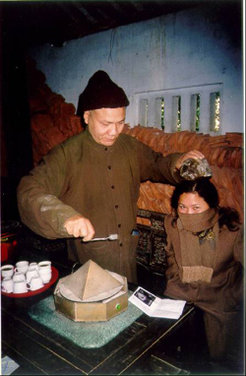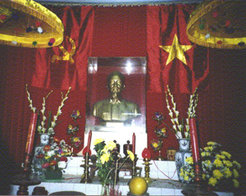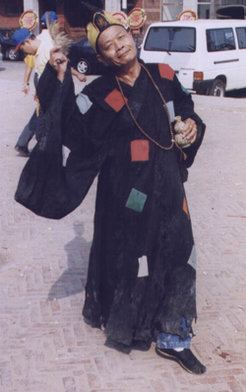Religion and Morality in South-East Asia
Friedrich Binder
Doktorand
Urban Spirit-Mediums and the Construction of Moralities in Modern Taiwan
Andrea Lauser
Wissenschaftliche Mitarbeiterin
The veneration of ancestors and pilgrimages in Vietnam
Edyta Roszko
Doktorandin
Buddhas, Gods and Spirits: Dialogic Interplay and Moral Dimensions in Vietnamese Religion
Gábor Vargyas
Assoziierter

This set of projects looks at religious changes in Taiwan and Vietnam. It has been observed that the transformation to modern market economies in East and Southeast Asia has not led to a decline in religious life and these countries thereby expose the inadequacy of standard modernization theory. But here one has to differentiate carefully. The Chinese and Vietnamese religious landscapes are complex and varied. In addition to the institutionalized religions of Taoism, Buddhism and Confucianism with their scriptures and clerics, the vast majority of the people engage in practices variously called Folk Religion or Popular Religion. The religious traditions mentioned above have been influenced by the socio economic changes of the recent decades but the latter have been more conductive to the development of certain elements of Chinese/Vietnamese religion than to others. Thus, the utilitarian aspect of popular religion and its commodification, which has always been present in popular religion, is now increasingly prominent. In Taiwan we see a proliferation of privately run spirit medium shrines which operate on a fee-for-service base (to be investigated in Binder`s research). In Vietnam the cult of the Holy Mothers, deities which grant immediate personal requests to individual worshippers, just like the deities at popular urban Taiwanese shrines, attracts an unprecedented number of followers (to be explored by Roszko and Lauser). These examples do not reflect traditional ties such as community and kinship and the moral assumptions, on which they rest, but rather the individualization and consumer values of the market world in which they have evolved.

On the other hand the impact of the market is felt by many to be a threat to “traditional” moral premises and assumptions. The perceived erosion of “traditional” values is also reflected in religious changes on many different levels. Thus, the Vietnamese state stresses the moral value of indigenous beliefs such as ancestor worship as well Buddhism. In Taiwan religious groups such as the Phoenix Halls (Luántáng鸞堂) or The Way of Unity (Yīguàndào一 貫道) are producing morality books which are distributed in bulk, stress Buddhist as well as Confucian values and specifically address the negative effects of market modernity. This twofold reaction which Weller refers to as “split market culture” is often not manifested as a clear cut opposition, rather we argue, that most groups as well as individuals seem to oscillate between the two extremes, which expresses their ambivalent attitude to recent socio economic changes.

The phenomena delineated above receive a further dimension among ethnic minorities such as the Bru – Vân Kiều, to be examined both in their homeland and in resettled communities by Gábor Vargyas, an external Senior Fellow associated with the group. In this case religious and culture change are coupled with discourses that emphasize the “primitiveness” of their “animistic” religion. The situation is aggravated by the fact that some Bru embraced Christianity, a religion that raises new moral questions, both on the part of its followers and in the eyes of the State.
The comparison of different facets of revitalization of religion in East and South-East Asian countries proceeds from a basic similarity in terms of religious pluralism. However, these two cases differ markedly in terms of political system and the scope of the involvement of the state in religious affairs. Our research looks at notions of morality in different social contexts. In both countries traditional ties and social networks such as kinship and community are presently being challenged. The moral assumptions that formed the base of these ties are also changing and new forms of communities - religious and other - are emerging. These changes are more often a restructuring of, rather than a complete break with, “traditional” ideas and practices. Chinese/Vietnamese popular religion is characterized by a high degree of flexibility and adaptability to changing circumstances. At the same time it is difficult to establish religious/moral authority. We seek to describe and explain how religious specialists as well as laypersons and the state draw on established concepts of morality such as debts to spirits and ancestors meritorious work,reciprocity, karmic retribution and filial piety, in order to integrate and create new social spaces and make social change comprehensible. At the same time we seek a better understanding of how these processes and the underlying moral assumptions and premises themselves are changing.


